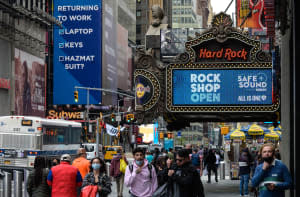How much fuel is still in the economy's tank?

The smartest insight and analysis, from all perspectives, rounded up from around the web:
Investors are growing increasingly worried that the best of the economic recovery is already in the rearview mirror, said Gunjan Banerji and Akane Otani at The Wall Street Journal. After a blistering first half of 2021 that saw the S&P 500 notch 39 record closes, the spread of the Delta coronavirus variant has emerged among "a growing list of concerns" that spooked the market this week and fueled questions about how quickly the global economy can keep growing. A rise in COVID cases in several countries, including the United States, has "reignited the debate about whether governments should resume lockdowns and curb activity." Amid the sell-off early this week — the Dow fell more than 700 points in one session, its worst since October — airline and energy stocks plummeted. Meanwhile, around the world the Delta variant threatened new supply shocks, last month shutting down China's Yantian port. "Fresh data last week showed that consumers stepped up spending in June," but growing inflation may also be starting to weigh on consumer sentiment, which plunged in early July. "Now, some investors are asking: Is this as good as it gets?"
Growth could easily fall short of the rosier forecasts, said Eric Lam and Sunil Jagtiani at Bloomberg. "Investors had earlier delighted in the prospect of a strong worldwide economic rebound fueled by easy money and vaccine rollouts." But supply shortages, rising prices, and stalling vaccination rates are forcing both consumers and traders to hit the brakes. Let's face it, said Neil Irwin at The New York Times, the future just isn't as promising as it looked two months ago. "The peak months for injection of federal stimulus dollars into the economy have passed. The legislative outlook on infrastructure and family support has become murkier." And the spread of Delta in other countries "could hold back demand for American exports."
U.S. consumers, though, remain exuberant about the post-pandemic reopening, said Sam Ro at Axios. There remains "a lot of pent-up demand coming from consumers with a lot of spending capacity" — $2.4 trillion, in fact, in excess savings accumulated since the beginning of the pandemic. Despite Monday's swoon, the S&P 500 is still up 14 percent this year. Even if other parts of the economy falter, if the five biggest tech companies alone continue their blistering growth, the S&P will attain most of the gains — "a little over 8 percent per year for two years" — it needs to reach the 5,000 mark.
The big question still unanswered is whether the economic damage from COVID was "avoided or deferred," said The Economist. We'll find out as government stimulus begins to wind down in the next month. Those measures introduced last year were "remarkably successful in preventing much of the economic scarring usually seen after a recession" and have enabled the American economy to bounce back quickly. So far, the evidence we have suggests most families saved their stimulus checks, mortgages and rent "bills are being largely repaid," and there are jobs available for those still leaning on the expanded unemployment benefits. But scaling back the generous and nearly universal support that many people have gotten used to will not be easy.
This article was first published in the latest issue of The Week magazine. If you want to read more like it, you can try six risk-free issues of the magazine here.
You may also like
Why Tom Brady's 'gentle' roast of Trump at Biden's White House was actually 'deeply vicious'
Megan Rapinoe addresses the U.S. women's soccer team's resounding Olympic loss to Sweden
